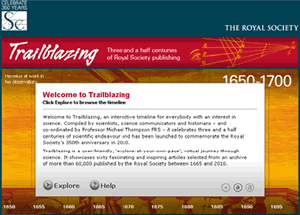Trailblazing
“The gruesome account of an early blood transfusion in 1666, Isaac Newton’s landmark paper on light and colour, Watson and Crick’s description of the evidence for the structure of DNA, and Stephen Hawking’s early writing on black holes in space are just some of the highlights of a new interactive timeline launched Monday 30 November to celebrate the 350th anniversary year of the Royal Society.
Trailblazing will offer unprecedented public access to the most influential, inspiring and intriguing papers published by the Royal Society over the last 350 years including the world-famous Philosophical Transactions (Phil. Trans.), the oldest continuously published scientific journal in the world. Leading scientists and historians have chosen 60 articles from amongst the 60,000 published since the journal first began in 1665. Trailblazing will make the original manuscripts available online for the first time alongside fascinating insights from modern-day experts who are continuing the work of scientific giants such as Newton, Hooke, Faraday and Franklin and making vital new breakthroughs of their own in areas such as genetics, physics, climate change and medicine.
Highlights include:
- The gruesome account of an early blood transfusion (1666)
- Captain James Cook’s explanation of how he protected his crew from scurvy aboard HMS Resolution (1776)
- Stephen Hawking’s early writing on black holes (1970)
- Benjamin Franklin’s account of flying a kite in a storm to identify the electrical nature of lightning — the Philadelphia Experiment (1752)
- Sir Isaac Newton’s landmark paper on the nature of light and colour (1672)
- A scientific study of a young Mozart confirming him as a musical child genius (1770)
- The Yorkshire cave discovery of the fossilized remains of elephant, tiger, bear and hyena heralding the study of deep time (1822)”
Source: Royal Society: Past, present, future
Categorized as: New resourcesBoth comments and pings are currently closed.

